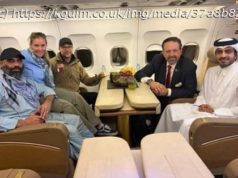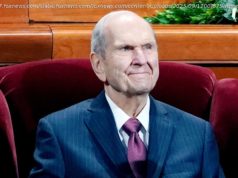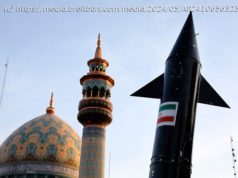Holt was thrown into Venezuela’s notorious Helicoide prison, filled with political prisoners claiming to have been subjected to torture and held without fair trials
WASHINGTON – President Donald Trump announced Saturday that Josh Holt, a U. S. citizen who had traveled to Venezuela to marry a woman he met online, had been released after two years in a Caracas jail. The Venezuelan government subsequently said both were on board a plane to the United States.
Holt, a Utah native, was released along with his now-wife, Thamy, according to a statement from Sen. Orrin Hatch, R-Utah, on Saturday. Holt had been accused by Venezuelan officials of stockpiling weapons and grenades in public housing, and his incarceration had become a major flash point in relations between Caracas and Washington.
“Over the last two years I’ve worked with two presidential administrations, countless diplomatic contacts, ambassadors from all over the world, a network of contacts in Venezuela, and President [Nicolás] Maduro himself,” Hatch said in a statement. “I could not be more honored to be able to reunite Josh with his sweet, long-suffering family in Riverton.”
Trump tweeted Saturday morning that Holt was scheduled to arrive in Washington and meet with his family at the White House at about 7 p.m. He added in a tweet later Saturday: “Looking forward to seeing Joshua Holt this evening in the White House. The great people of Utah are Celebrating!”
“As announced by the president, our son and his wife will be released today. We thank you for your collaboration during this time of anguish,” the Holt family said in a statement. “We ask that you allow us to meet with our son and his wife before giving any interviews and statements. We are grateful to all who participated in this miracle.”
I’ve been begging my government for two years. They say they’re doing things, but I’m still here
The release comes amid a shaky period in U. S.-Venezuela relations and just days after Maduro won re-election in a vote that has been widely denounced as illegitimate. Senate Foreign Relations Committee Chairman Bob Corker, R-Tenn., traveled to Caracas on Friday and was shown on state television shaking hands with the president.
On Saturday, Venezuelan Information Minister Jorge Rodriguez told journalists in Caracas that Holt’s release was the product of “months” of “fruitful meetings” between Maduro and U. S. lawmakers. A day earlier, he described the encounter between Maduro and Corker as “a very good meeting; it is good news for the Venezuelan people.”
Corker’s office did not respond to a request for comment, but Hatch thanked him for his “pivotal efforts,” and Caleb McCarry, a Corker foreign policy aide who accompanied Corker on the trip, according to The Associated Press. Hatch was officially notified Friday that Holt’s release was being finalized, according to an official familiar with the events, and Corker had kept in close contact with Hatch, who had spoken several times with Maduro over the last few months about Holt’s situation.
“In the end, Corker was the closer,” the official said.
Analysts suggested Holt’s release was part of a bid to ease the fast-eroding bilateral relations between Washington and Caracas. U. S. financial sanctions have sharply contributed to the Venezuelan economy’s nose dive, and fears have built that the United States – the largest cash buyer of Venezuelan oil – would impose a potentially crippling embargo.
“As part of . the peace and reconciliation being presented by President Maduro, he ordered the liberation of the American Joshua Holt and his wife,” Rodriguez said a Saturday news conference at the presidential palace. He added, “We hope this is read by sectors that permanently promote the attack of Venezuela as a profound intention to seek peace between Venezuelans and the people of the world.”
Holt’s release came as Maduro appears to be on a public relations offensive following the widely condemned elections last week, seeking to make gestures toward his international and domestic critics. On Friday, the government freed 20 political prisoners in the interior state of Zulia. Yet the Venezuelan human rights group Foro Penal called the effort simply part of a new “revolving door policy” in which some prisoners were being released even as others were being detained. One of the directors of the group said at least 14 dissidents had been jailed this week.
The move additionally comes as Maduro is seeking to boost his legitimacy in the wake of last week’s election, in which he won a new six-year term after a vote condemned internationally as a fraudulent power grab. He has sought to reach out to an opposition he largely barred from participating in the vote and offered dialogue to a business community he has demonized in the past.
Maduro is “trying to see if his isolation can partially be reversed,” said Mariano de Alba, a Venezuelan lawyer specializing in international law. “It’s a measure meant to somehow lower tensions.”
As part of . the peace and reconciliation being presented by President Maduro, he ordered the liberation of the American Joshua Holt and his wife
A Mormon missionary from Utah, Holt — called the “Gringo Agent” in Venezuela — became the ultimate example of an American in the wrong place at the wrong time. He was arrested by Venezuelan security forces in June 2016, days after he married Venezuelan resident Thamara Caleño.
Venezuelan officials, using evidence Holt called invented, accused him of being a U. S. agent masterminding a plan to destabilize Venezuela by amassing explosives and guns.
Holt was thrown into Venezuela’s notorious Helicoide prison, a compound filled with political prisoners who claim to have been subjected to torture and held without fair trials.
Both Holt and U. S. officials have denied all charges. On May 16, Holt issued dramatic videos from his prison cell following a riot.
“I’ve been begging my government for two years. They say they’re doing things, but I’m still here,” a distraught Holt, 26, said in a video posted to his Facebook account — part of desperate messages aimed at pressuring the U. S. government to free him as conditions in Venezuela deteriorated.
His pleas sparked high-level diplomatic maneuvering. Restatements of demands for his release were issued by senior U. S. politicians, and Todd Robinson, then the chief of mission at the U. S. Embassy in Caracas, showed up at Venezuela’s Foreign Affairs Ministry in Caracas to demand information about his safety.
Домой
United States
USA — Political U. S. citizen is freed two years after he traveled to Venezuela...






